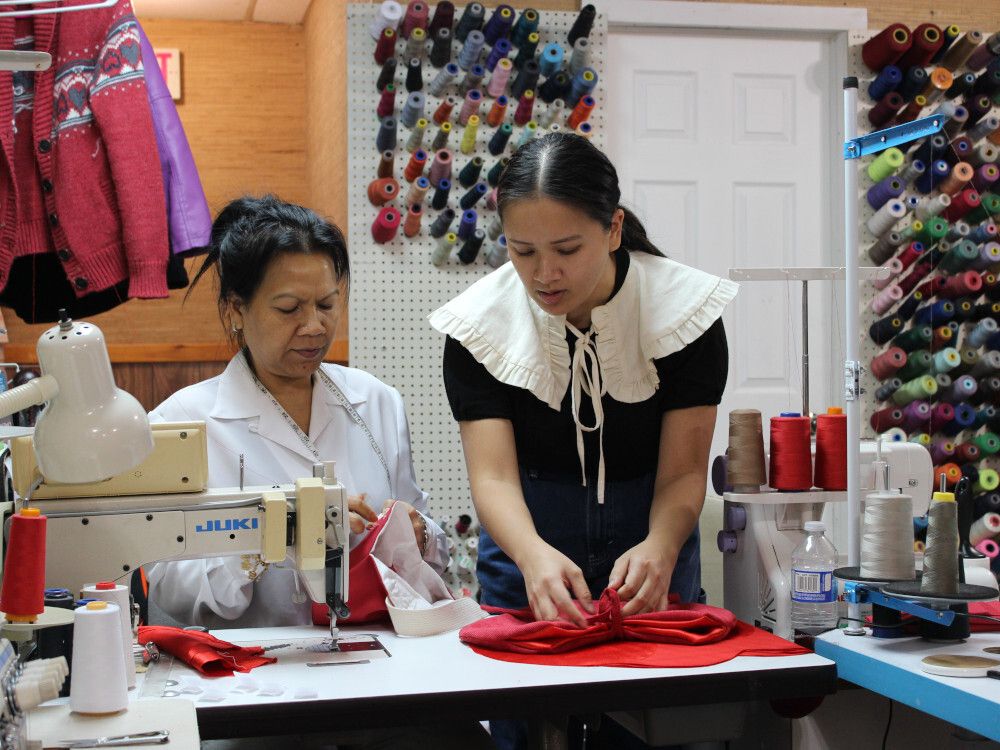Buyers across the country continue to strive
As the holiday season begins, those patriotic intentions may run up against the harsh economic reality of a still-high cost of living, retail experts say.
In early 2025, Canadians responded to the U.S. trade war with an unprecedented show of support for domestic products, but they are now showing signs of a “gap in attitudes and behavior,” said Melise Panetta, a marketing lecturer at Wilfrid Laurier University's Lazaridis School of Business and Economics.
“They still want to buy Canadian oil and they will if they have the ability to do so and it makes economic sense for them,” Panetta said. “But they are obviously under a lot of pressure and concerned about their costs.”
marks the start of a crucial holiday shopping season, and it will test how far consumers will go as they may be faced with a choice between buying a Canadian product and the bargain they might find in a tougher economy.
Nina Noon, owner of With Nini, a small online fashion and home goods business based in Ottawa, Ont., said she is still banking on the Buy Canada movement to keep her business alive.
Noon designs and sews clothing and accessories with her mother, as well as some help from a Toronto-based production team. She said her costs are rising, but advocates for shopping local or Canadian have helped make environmentally conscious and ethical production more viable for her business.
However, she has noticed that shoppers are becoming more price-conscious and focused on making informed purchases, she said.
“Maybe in previous years (customers) would have bought three T-shirts and this year they could spread out their spending a little more,” she said. “They're a little more conservative… I'm definitely seeing a little more stress this year than in previous years.”

Industry reports are mixed on how constrained consumers will fare against the surge in holiday shopping.
PricewaterhouseCoopers (PwC) predicts a 10 per cent decline in Canadian purchases this season compared to last year, with an average spend per shopper of $1,675. But a Deloitte Canada report on the holiday retail outlook said spending is expected to increase slightly, up three per cent from 2024.
“Regardless of any economic circumstances, morale is high right now and people are feeling positive,” said Shonna Conway, partner and national retail sector leader at Deloitte Canada. “We have an attentive consumer, cautious but optimistic, and that's helping to insulate our economy.”
The Deloitte report also found that nearly three-quarters of Canadians prefer to support local or Canadian businesses, but Conway said the reality is that shoppers will continue to prioritize the lowest-priced or best option.
“If brand equity or price differentiation is too high, they will continue to turn to online markets,” she said.
Amazon continues to dominate the holiday shopping market, with 70 percent of shoppers saying they will buy gifts through the e-commerce giant, according to a Deloitte report.
However, local retailers may still see some benefits when it comes to share of consumers' wallets.
According to a November survey from business technology platform Square (owned by Block, Inc.) conducted by Leger Marketing Inc., 62% of Canadians said they plan to be “pro-Canada” this Black Friday weekend and allocate more of their holiday budgets to supporting local retailers.
Square provides point of sale and other software to small businesses around the world. While Square's transaction data showed many shoppers around the world were interested in supporting local economies, that was especially true in Canada, said the company's chief marketing officer Lindsey Irwin.
Of those who plan to shop more locally this season, more than half said they would pay up to 50 percent more for Canadian products, according to a Square report.
That level of ambitious patriotism may be overwhelming given consumers' struggle with the cost of living, said Toronto retail analyst Bruce Winder.

The consumer price index was up 2.2 per cent year-over-year as of October, according to Statistics Canada, and Winder said shoppers will have to face the “economic reality” of giving gifts while still paying their bills.
“If (buyers) see certain categories where there's a pretty big price difference, like 20 or 30 percent, they'll probably go out and buy an import unless they're wealthy,” Winder said.
He noted that some products may have a hard time finding Canadian alternatives, such as electronics, which make up a large share of gifts but are typically made in Asia.
Consumer price sensitivity was also demonstrated during
Loblaw Co.'s latest earnings report. Ltd.
in November when Per Bank's chief executive said customers were buying more discounted items to keep their costs low.
The bank said the end of Canadian counter-tariffs in September also impacted the Buy Canadian equation: When Loblaw stores eliminated associated price increases and tariff tags on some U.S. products, shoppers came back.
“We're seeing some customers going back to the products they like now that they're much cheaper than they were, and that will have some impact on sales in Canada overall,” Bank said during the call.
Statistics Canada also recently
nearly two-thirds of businesses saw no increase in sales of Canadian products over the previous six months.
Francois Neuville, assistant professor of strategic management at McMaster University's DeGroat School of Business, said “buy Canada” sentiment is still present, but it is waning from its peak in spring 2025.
Neville said part of that could be because the White House is moving away from its rhetoric around annexing Canada. “I think a lot of the emotions that drove the movement were really an expression of Canadian sovereignty,” he said. “Taking away rhetoric is like taking some oxygen out of the fire.”
But price can also take precedence. A majority of respondents to the latest holiday shopping survey from the Retail Council of Canada (RCC) and Leger said price remains a top factor and they rely heavily on specials and discounts to manage spending. More than half of those surveyed said that the Black Friday shopping event is the most important shopping moment of the year.
“Nearly 60 percent said holiday shopping continues to be stressful, which is the highest percentage we've seen in four years,” said Santo Ligotti, vice president of member services and marketing at RCC, adding that 40 percent of respondents said they would also consider donating used items.
The RCC and Leger survey also found that holiday budgets were fairly stable this year, which Ligotti said could indicate shoppers are trying to get more for less.
Wilfrid Laurier's Panetta said the survival of small businesses is more likely to depend on the Buy Canada movement.
“Crafts markets and small and medium-sized businesses have been the first to be hit by the Buy Canadian movement,” she said, noting those businesses have grown about 6.5 per cent this year.
Another small business owner, Mary Johnson, who runs Kids 'N Krafts children's store in Hamilton, Ont., said she has noticed shoppers shopping less this year.
“One day (parents could buy their girl) a dress, a playsuit and a pair of socks or a hat or a combination of both,” she said. “Now they buy maybe a dress and socks or a pair of tights.”
Andrea Bourgeois, director of economics at the Canadian Federation of Independent Business (CFIB), said small businesses remain optimistic, but they don't expect a stronger shopping season compared to pre-pandemic years.
In fact, compared to last year's holiday season, one in five small businesses expect sales revenue to decline, while just over half expect sales to remain flat, according to
.
Winder predicts Black Friday and Cyber Monday will be much more important to shoppers this year as more people look for deals rather than paying full price for items. Local stores will have to consider offering some kind of holiday discounts to attract shoppers, he said.
“Even if you save 10 to 20 percent, it’s better than (nothing),” Winder said. “It’s hard for me to see people buying a lot at regular prices this year.”
Annie VanRivong, owner of gift and home goods store Wolf & Rebel in Windsor, Ont., said she's launching her first Black Friday and Small Business Saturday sale this weekend, offering 50 per cent off all items.
“This year, I feel it is more necessary to sacrifice more of our profits to get products off our shelves,” Vanrivong said. “I hope the discounts will bring people in.”
• Email: [email protected]








